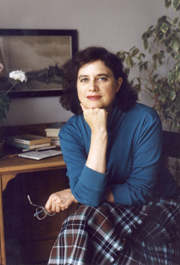 |
 |
|
|

Sheila McLeod Arnopoulos
|
by Jane Shulman
Sheila McLeod Arnopoulos is making the most of her sabbatical
by travelling, writing and conducting research in Asia.
The journalism lecturer and novelist just returned from northern China,
where she taught in Harbin, a city of five million. She was first offered
an opportunity to visit China two years ago, when she was planning a teaching
trip to Japan.
Her first sojourn in China was rather sheltered. “I stayed in a residence
on campus that was for international people who were at the school. I was
very busy, but everything I did was academic. I was picked up, taken to
class, sometimes I went for lunch with people, and then I was driven back
to the residence.”
This time, she wanted to explore cross-cultural issues by getting her Chinese
students to compile an anthology similar to the one produced in her Lonergan
College course at Concordia. Instead, she was asked to teach six courses,
four in journalism and two in creative writing.
She approached the assignment cautiously. “I didn’t want to cause
any problems for the students by asking them to do something that could
compromise their safety.” The other difficulty was that she couldn’t
read the Chinese newspapers to learn what they were reporting.
A few days after she arrived in China, one of her colleagues asked her to
teach English to some children whose parents work in a boiler factory. “I
was teaching a couple of classes of about 20 kids crammed into a tiny and
excruciatingly hot room. Often, four or five parents would stand at the
back of the room.”
She was pleased by the opportunity to meet so many people with different
backgrounds and interests who showed her the sights of Harbin. She spent
time with a man who is a poet and journalist, and he introduced her to people
away from the academic world.
The Chinese appeared to her to be adjusting to capitalism with difficulty.
“It’s the worst of capitalism and the worst of communism,”
she said. For example, Harbin’s bus service was recently privatized,
and the competition between companies is so fierce that drivers often ignore
the rules of the road to get passengers to their destinations as quickly
as possible.
It was the same in many industries. “There is competition, unregulated
privatization, social services are lacking and there’s a feeling that
people have to leave in order to succeed.”
Now she’s off to India, where she will “report on something positive.”
She plans to write about three groups of women who help themselves, their
families and their communities in terms of agriculture, health and education
by borrowing money from small banks in the form of microcredits.
They buy land where nothing is growing, and work on the soil until it becomes
fruitful. They feed their families and sell part of the produce they grow.
Through the dividends, they develop adult education and literacy programs.
“I want to look at something that challenges the notion that technology
is required, that the Western way of doing things is the only way.”
|
|
|



